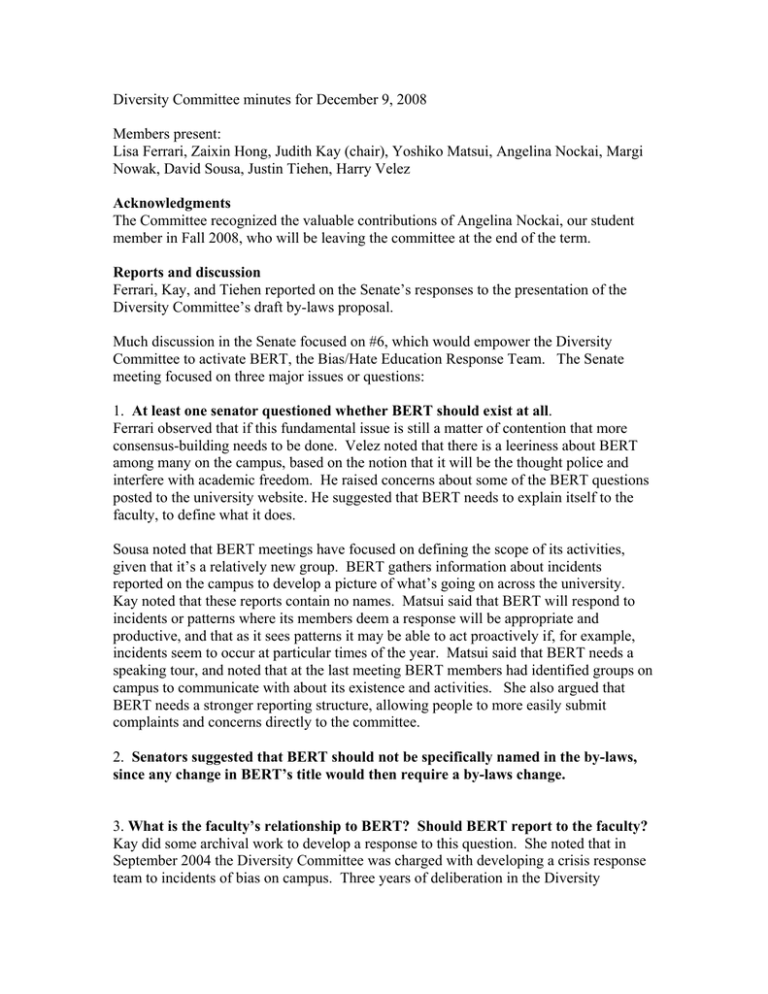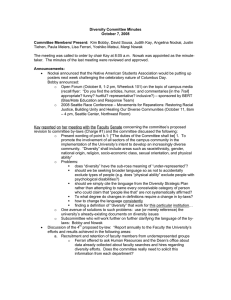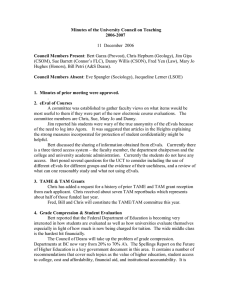Diversity Committee minutes for December 9, 2008 Members present:
advertisement

Diversity Committee minutes for December 9, 2008 Members present: Lisa Ferrari, Zaixin Hong, Judith Kay (chair), Yoshiko Matsui, Angelina Nockai, Margi Nowak, David Sousa, Justin Tiehen, Harry Velez Acknowledgments The Committee recognized the valuable contributions of Angelina Nockai, our student member in Fall 2008, who will be leaving the committee at the end of the term. Reports and discussion Ferrari, Kay, and Tiehen reported on the Senate’s responses to the presentation of the Diversity Committee’s draft by-laws proposal. Much discussion in the Senate focused on #6, which would empower the Diversity Committee to activate BERT, the Bias/Hate Education Response Team. The Senate meeting focused on three major issues or questions: 1. At least one senator questioned whether BERT should exist at all. Ferrari observed that if this fundamental issue is still a matter of contention that more consensus-building needs to be done. Velez noted that there is a leeriness about BERT among many on the campus, based on the notion that it will be the thought police and interfere with academic freedom. He raised concerns about some of the BERT questions posted to the university website. He suggested that BERT needs to explain itself to the faculty, to define what it does. Sousa noted that BERT meetings have focused on defining the scope of its activities, given that it’s a relatively new group. BERT gathers information about incidents reported on the campus to develop a picture of what’s going on across the university. Kay noted that these reports contain no names. Matsui said that BERT will respond to incidents or patterns where its members deem a response will be appropriate and productive, and that as it sees patterns it may be able to act proactively if, for example, incidents seem to occur at particular times of the year. Matsui said that BERT needs a speaking tour, and noted that at the last meeting BERT members had identified groups on campus to communicate with about its existence and activities. She also argued that BERT needs a stronger reporting structure, allowing people to more easily submit complaints and concerns directly to the committee. 2. Senators suggested that BERT should not be specifically named in the by-laws, since any change in BERT’s title would then require a by-laws change. 3. What is the faculty’s relationship to BERT? Should BERT report to the faculty? Kay did some archival work to develop a response to this question. She noted that in September 2004 the Diversity Committee was charged with developing a crisis response team to incidents of bias on campus. Three years of deliberation in the Diversity Committee led to the creation of BERT, which would provide for a proactive response to incidents on the campus, and which would free targeted groups from having to respond to incidents and educate the larger community on their own. In Spring 2007 the Diversity Committee reported that it did not believe that it had the authority under the existing bylaws to activate BERT. The Diversity Committee of 2007-08 had recommended to the Senate an explicit article in the new by-laws to give authority of the committee over its own creation. Kay argued that BERT should report to the faculty. The faculty played an important role in creating BERT, and, if there are concerns about BERT infringing on speech or academic freedom, the faculty would be the strongest defenders of these values. Matsui noted that at present it appears that BERT belongs to the Academic Vice President and the Dean of Students office, through the co-chairs of the committee (Kim Bobby, Chief Diversity Office, and Donn Marshall, Associate Dean of Students), and that it addresses academic and campus life issues. Matusi reminded the Committee that BERT has no enforcement or adjudicatory function; its purpose is educational and refers individuals with concerns that may violate university standards (such as the Integrity Code or the Sexual Harassment Policy) to appropriate bodies. Velez observed that the faculty played a key role in creating BERT, and that it needed to take ownership of it to deal with problems. He suggested that we establish a requirement that BERT report directly to the Faculty Senate every year. After some discussion, the Committee decided to seek further, structured guidance from the Senate on activating BERT. The Committee will take three versions of the new bylaws back to the Senate. (The numbering here does not indicate any committee preference ordering. It is for convenience only.) Version 1 of the by-laws will drop any reference to BERT. Version 2 of the by-laws could contain the language of by-law #6 already discussed by the Senate: Version 3 of the by-laws would contain new language: To activate the group responsible for creating educational opportunities relating to incidents or emerging trends that involve prejudice or bigotry; to collaborate with this group, as needed; to assert the value of academic freedom, as needed; and to make an annual report to the Faculty Senate. The Committee will meet again on January 21 at 8 a.m., and members will present this material to the Senate for discussion at the Senate meeting on the following Monday.




